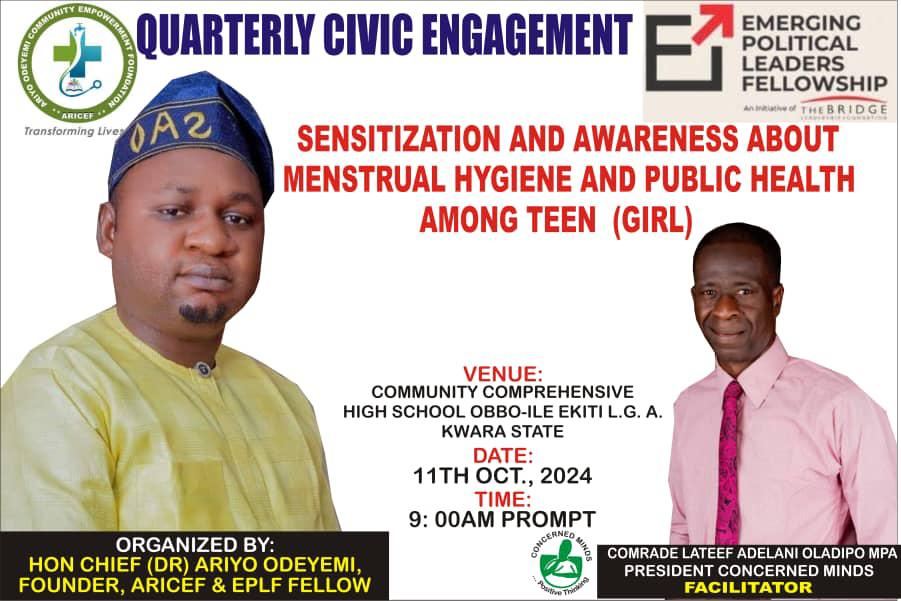In alignment with the EPLF’s pillar on Civic Engagement, Ariyo Odeyemi implemented a civic engagement activity centred on Sensitization and Awareness on Menstrual Hygiene and Public Health for adolescent girls. This event was held on the 11th of October 2024 at Community Comprehensive High School, Obbo Ile, in Ekiti Local Government of Kwara State, and coincided with the commemoration of the International Day of the Girl Child. A total of 62 female participants, aged 11-18, attended the programme.
Objective of the Activity
The primary objective of this activity was to create awareness about menstrual hygiene among adolescent girls, a critical issue that is often overlooked due to socio-cultural barriers. These barriers, particularly in rural communities, limit young girls’ access to accurate information regarding reproductive health and menstruation. The session aimed to educate the girls on the importance of maintaining proper menstrual hygiene to safeguard their health and well-being. Additionally, this engagement was an opportunity to assess the participants’ current understanding of menstrual hygiene, allowing for more targeted future interventions.
Key Outcomes
The activity successfully provided participants with essential knowledge on how to manage menstruation and practice good hygiene during their cycles. The girls learned about the physical symptoms of menstruation and how to care for themselves during this period. Sanitary pads and personal hygiene materials were distributed to all the participants as part of the initiative to encourage proper menstrual care. By addressing menstruation openly, the session also broke the silence that often surrounds the topic, helping the girls become more confident and informed about their own bodies. This awareness further emphasized the importance of menstrual hygiene, which plays a crucial role in preventing health risks such as reproductive and urinary tract infections—conditions that, if untreated, could lead to infertility or complications during childbirth.
Key Highlights and Achievements
The programme achieved its goal of breaking down the stigma associated with menstruation, fostering a sense of openness and understanding among the students. Participants were encouraged to ask questions and share their personal experiences, creating a safe and supportive environment for learning. The distribution of 10 large packs of sanitary pads was a practical step in addressing the immediate hygiene needs of the girls. Moreover, the session raised public awareness about the serious health risks associated with poor menstrual hygiene and the long-term consequences it could have on young girls’ reproductive health.
Lessons Learnt
From the programme, it became evident that the students were eager to learn and open to new information. Their active participation throughout the session, as well as the thoughtful questions they asked, highlighted their willingness to embrace change and improve their understanding of reproductive health. The girls shared their experiences of adapting to the physical changes in their bodies and were provided with practical solutions to some of the concerns they raised. This engagement with the topic was encouraging, as it signalled that these young girls are on a path to becoming more informed and self-assured about their health. Their enthusiasm and attentiveness throughout the programme offer hope for a brighter future where they can confidently navigate their own reproductive health.
Unintended Outcomes
One unexpected outcome of the activity was the high level of interest and engagement displayed by the participants. Given the rural setting of the school, it was initially assumed that the students might be hesitant or less interested in such topics. However, they were not only attentive and well-behaved but also exceptionally eager to learn. This eagerness revealed the significant untapped potential for educating young girls in rural communities on matters of health and well-being.
Way Forward and Recommendations
There is a pressing need to continue organizing sensitization programmes like this in other schools, particularly in rural and underserved areas. Ongoing education is essential to ensure that more girls are informed about menstrual hygiene and public health. To make a more lasting impact, it is important to call on notable Nigerians, philanthropists, and non-governmental organizations to support such initiatives. Their contributions, in the form of donations of sanitary pads and other hygiene materials, would go a long way in supporting the health and education of young girls in public schools.
Follow-up and Next Steps
A follow-up to this programme is necessary to provide continued support and monitor the progress of the girls who participated. There is a need to ensure a consistent supply of sanitary pads and hygiene materials for the students. During this engagement, 10 large packs of sanitary pads were provided as a gesture of encouragement, but ongoing support will be essential to meet the girls’ long-term needs. A sustained focus on menstrual hygiene education will empower these young girls to take control of their health and futures.

